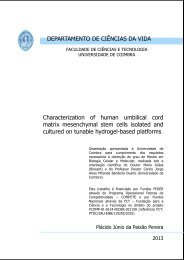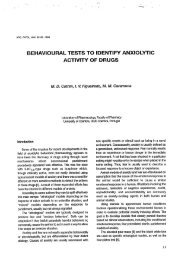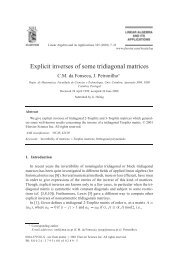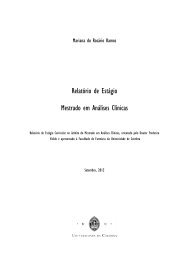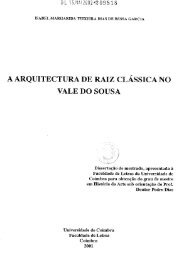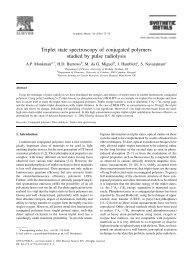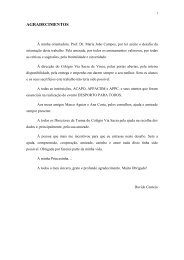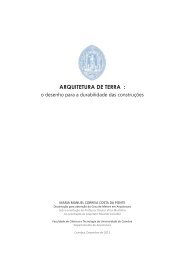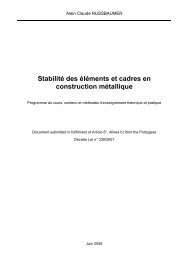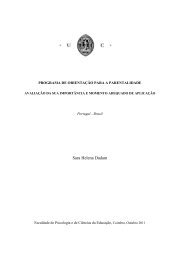- Page 1 and 2:
Imagem Fabrice Aimé Fernand Schurm
- Page 6 and 7:
Índice de conteúdos Agradecimento
- Page 8 and 9:
RESUMO A leitura de vários autores
- Page 10 and 11:
ABSTRACT: THE POST-COLONIAL STATE T
- Page 12 and 13:
INTRODUÇÃO O conceito de Estado p
- Page 14 and 15:
no seio do pensamento filosófico d
- Page 16 and 17:
omance Things Fall Apart, interpret
- Page 18 and 19:
em três partidos únicos estatizad
- Page 20 and 21:
campo literário angolano como o do
- Page 22 and 23:
linguística (o francês padrão) a
- Page 24:
no Sul, esta maneira de interpretar
- Page 27 and 28:
uma certa crítica, os textos pós-
- Page 29 and 30:
foram definidos através de um disc
- Page 31 and 32:
de hibridez a principal aporia das
- Page 33 and 34:
O seu século XVI não corresponde
- Page 35 and 36:
homólogo anglo-saxónico. Talvez o
- Page 37 and 38:
literatura. Parece-me que essa arti
- Page 39 and 40:
supranacionais que interessam (a tr
- Page 41 and 42:
aplicação - o que equivale a glob
- Page 43 and 44:
ser sobreposto às afirmações de
- Page 45 and 46:
que escrevem noutras línguas, o po
- Page 47 and 48:
com e nutre-se do recurso à metáf
- Page 49 and 50:
enfraquecida («weakened») para um
- Page 51 and 52:
Talvez a maior falta em Gyasi ou em
- Page 53 and 54:
chegavam a «colegas». Na Argélia
- Page 55 and 56:
libertados que se tinham «ambaquiz
- Page 57 and 58:
As razões são óbvias: do ponto d
- Page 59 and 60:
semelhança do tradutor, tenho tamb
- Page 61 and 62:
Santos exprime nesse mesmo lugar a
- Page 63 and 64:
É precisamente neste ponto que vej
- Page 65 and 66:
Je me représente la carte culturel
- Page 67 and 68:
Por outro lado, houve no Norte uma
- Page 69 and 70:
parece reificar. O que sobressai da
- Page 71 and 72:
sua vez, vê sobretudo a «fronteir
- Page 73 and 74:
ser um intelectual que radica o seu
- Page 75 and 76:
A hibridação como limite experime
- Page 77 and 78:
posicionamento das suas «fronteira
- Page 79 and 80:
poeta e ensaísta Abdelkébir Khati
- Page 81 and 82:
ou cedo confrontado com problemas d
- Page 83 and 84:
ecursos materiais e simbólicos par
- Page 85 and 86:
eescrita das memórias em conflito
- Page 87 and 88:
1975 a partir de Lisboa, devido ao
- Page 89 and 90:
figuras e de representações sempr
- Page 91 and 92:
personagem que declama perante uma
- Page 93 and 94:
afirmação que vale como programa
- Page 95 and 96:
Quelle société que celle où vos
- Page 97 and 98:
obsessão francesa pelo pedido de d
- Page 99 and 100:
pouco mais à frente, acrescenta:
- Page 101 and 102:
do regime no desenvolvimento e na s
- Page 103 and 104:
Ensemble de conduites, de réflexes
- Page 105 and 106:
difundir-se, de maneira mais ou men
- Page 107 and 108:
nos encontramos no início do traba
- Page 109 and 110:
até o desenvolvimento) de relaçõ
- Page 111 and 112:
discursos e as práticas racistas p
- Page 113 and 114:
colonial, mas também para duas for
- Page 115 and 116:
Vários críticos explicaram a ado
- Page 117 and 118:
Novels are invoked to lend support
- Page 119 and 120:
Ter-se-á notado aqui a introduçã
- Page 121 and 122:
contexto é o de controlo do espaç
- Page 123 and 124:
inconditionnalité et du régime d
- Page 125 and 126:
É também essencial entender com M
- Page 127 and 128:
colónia (esta não deveria custar
- Page 129 and 130:
Com estas observações, o que come
- Page 131 and 132:
universitário, diminuição do pap
- Page 133 and 134:
verticale, et avec une main de fer,
- Page 135 and 136:
Europa, e que aplicado precipitadam
- Page 137 and 138:
cette institution européenne qui s
- Page 139 and 140:
L’apothéose de l’indépendance
- Page 141 and 142:
cercle des initiés. Le système, a
- Page 143 and 144:
dominação estrangeira (colonos qu
- Page 145 and 146:
continuar a utilizar a metáfora te
- Page 147 and 148:
Os autores mostram que a maior part
- Page 149 and 150:
organizar os projetos de desenvolvi
- Page 151 and 152:
Torna-se assim cada vez mais patent
- Page 153 and 154:
que contratava com funcionários di
- Page 155 and 156:
do mundo, que serve de explicação
- Page 157 and 158:
146
- Page 159 and 160:
A dificuldade da definição de tr
- Page 161 and 162:
O que possivelmente alude melhor à
- Page 163 and 164:
peça» e, em segundo lugar, um «F
- Page 165 and 166:
IV.2. O SENSO COMUM E O TRÁGICO É
- Page 167 and 168:
É aliás a pergunta que coloca de
- Page 169 and 170:
explique aussi pourquoi un tel fait
- Page 171 and 172:
La vie de Michel telle qu’il la r
- Page 173 and 174:
masculino do corpo feminino tornado
- Page 175 and 176:
mas, pelo seu estatuto - seres desp
- Page 177 and 178:
funestas de um ato ou de uma série
- Page 179 and 180:
exemplo, em várias personagens de
- Page 181 and 182:
premissas colocadas na Carta, retom
- Page 183 and 184:
elle-même. Calderon le dit avec fr
- Page 185 and 186:
trágico, Abraão, pelo contrário,
- Page 187 and 188:
Le phénomène du tragique ne nous
- Page 189 and 190:
externa e superior para explicar o
- Page 191 and 192: inicial e principal da Poética, a
- Page 193 and 194: souci de vivre mieux, dans ce ici e
- Page 195 and 196: «Um destino realmente trágico»
- Page 197 and 198: fundamental - mais perturbador tamb
- Page 199 and 200: Um dos fatores a tomar em conta, e
- Page 201 and 202: Citado por muitos, objeto de extrap
- Page 203 and 204: Assim, o crítico assume que Arist
- Page 205 and 206: investigação essencial sobre as m
- Page 207 and 208: como o fim da representação, rest
- Page 209 and 210: tragédia. Ambos utilizam a piedade
- Page 211 and 212: précises et dont pourtant l’évi
- Page 213 and 214: tragédia. O lado duplo, ou dúplic
- Page 215 and 216: que acontece em Édipo Rei. A peste
- Page 217 and 218: duas vezes) -, percebe que a sua de
- Page 219 and 220: normalmente «mais ses mouvements s
- Page 221 and 222: a Segunda Guerra Mundial e em plena
- Page 223 and 224: Estes últimos exemplos colocam a q
- Page 225 and 226: parfois en contradiction avec les f
- Page 227 and 228: não entender todas as conotações
- Page 229 and 230: apagamento das fronteiras: «Rather
- Page 231 and 232: V.3. RELER E REESCREVER OS CLÁSSIC
- Page 233 and 234: contrário do que acontece com as d
- Page 235 and 236: colonialismo. Antígona, num dos mo
- Page 237 and 238: contra uma macro-estrutura (o Estad
- Page 239 and 240: A partir deste momento, o Estado in
- Page 241: contexto sociopolítico. Tudo nas s
- Page 245 and 246: língua. De facto, os dramaturgos -
- Page 247 and 248: 236
- Page 249 and 250: Acrescenta-se que naquele espaço d
- Page 251 and 252: Do outro lado do rio, no mesmo ano,
- Page 253 and 254: d’Afrique demandons têtument la
- Page 255 and 256: paratexto orienta a receção da pe
- Page 257 and 258: Notar-se-á que a originalidade for
- Page 259 and 260: Tomadas estas precauções, se o pa
- Page 261 and 262: entendido como mega-estrutura que d
- Page 263 and 264: Ntambue, tornando-se deste modo suj
- Page 265 and 266: Elle a ainsi acquis une dimension p
- Page 267 and 268: própria num novo despotismo. É o
- Page 269 and 270: inutilidade funcional, a insensatez
- Page 271 and 272: Luendo deixa o médico que foge no
- Page 273 and 274: uma violência que, consoante o mé
- Page 275 and 276: Uma compilação das réplicas de L
- Page 277 and 278: conivência em Mbembe (Capítulo II
- Page 279 and 280: A palavra casa remete nesta perspet
- Page 281 and 282: um acontecimento ocorre, é sempre
- Page 283 and 284: A fábula evidencia o quão empenha
- Page 285 and 286: ou seja «la vie, le temps, la paix
- Page 287 and 288: Como o sabemos, o trágico tem tamb
- Page 289 and 290: A curta didascália inicial coloca
- Page 291 and 292: Morin chamava a sua parte demens. A
- Page 293 and 294:
chier!» diz o texto), para exercer
- Page 295 and 296:
contexto político, a macro-estrutu
- Page 297 and 298:
pelo menos de um vestígio de digni
- Page 299 and 300:
consegue viver sem ele porque, entr
- Page 301 and 302:
estar gravemente doente do coraçã
- Page 303 and 304:
VI. 8. ANTOINE M’A VENDU SON DEST
- Page 305 and 306:
Em Antoine m’a vendu son destin,
- Page 307 and 308:
la gueule à votre Histoire timbré
- Page 309 and 310:
personagens trágicas do teatro gre
- Page 311 and 312:
justificar a repressão. É o que a
- Page 313 and 314:
Esta possibilidade de rutura da cir
- Page 315 and 316:
Estado, colonial e pós-colonial, e
- Page 317 and 318:
para o moldar às exigências da co
- Page 319 and 320:
Césaire e Labou Tansi quando retom
- Page 321 and 322:
Sabe-se que a questão do ponto de
- Page 323 and 324:
ganham responsabilidade e conseguem
- Page 325 and 326:
final. Cegos pela parte demens do s
- Page 327 and 328:
A «diferença» em questão corres
- Page 329 and 330:
inovações genológicas e estrutur
- Page 331 and 332:
grandes conflitos mundiais, dos gen
- Page 333 and 334:
ecetor, o romance policial já conv
- Page 335 and 336:
Para ser breve, nos romances polici
- Page 337 and 338:
VII. 2. 3. PERSONAGENS É conhecida
- Page 339 and 340:
sobre a personagem do investigador.
- Page 341 and 342:
conta com os outros, acaba por ser
- Page 343 and 344:
Uma certa crítica entende interpre
- Page 345 and 346:
Nota-se desde já que esta ligaçã
- Page 347 and 348:
Mais uma vez, Pepetela delega numa
- Page 349 and 350:
dia descobria muita coisa nova» (P
- Page 351 and 352:
amizade entre os dois jovens acaba
- Page 353 and 354:
Pois é. Quando eu estava na guerra
- Page 355 and 356:
co-presença de vontades que nem se
- Page 357 and 358:
A ironia que resulta aqui da reduç
- Page 359 and 360:
Lopes, poderia ter reconhecido que
- Page 361 and 362:
Terestchenko, que experimentamos se
- Page 363 and 364:
República Democrática do Congo, o
- Page 365 and 366:
Le rôle de l’écrivain, du même
- Page 367 and 368:
Unidas. Eis o que dizia num artigo
- Page 369 and 370:
literatura de grande produção ou
- Page 371 and 372:
Parece-me, porém, questionável a
- Page 373 and 374:
Se um trabalho sobre o trágico aju
- Page 375 and 376:
Para voltar ao trágico encarado nu
- Page 377 and 378:
peças de Shakespeare antes de come
- Page 379 and 380:
- Labou Tansi, Sony (2006), Cercuei
- Page 381 and 382:
- Bauman, Zygmunt (2007), Liquid Ti
- Page 383 and 384:
- Mbembe, Achille (2007 b ), «De l
- Page 385 and 386:
- Bancel, Nicolas, Blanchard Pascal
- Page 387 and 388:
- Diop, Boubacar Boris, Verschave,
- Page 389 and 390:
- M’Bokolo, Elikia (2006), «Afri
- Page 391 and 392:
- Traoré, Aminata D. (1999), L’
- Page 393 and 394:
- Beti, Mongo (2007 a ), «Conseils
- Page 395 and 396:
- Mopoho, Raymond (2001), «Statut
- Page 397 and 398:
-Barbolosi, Laurence (2004), «Les
- Page 399 and 400:
- Lourenço, Eduardo (2004), «Da l
- Page 401 and 402:
- Vernant, Jean-Pierre, Vidal-Naque
- Page 403 and 404:
- Djungu-Simba K., Charles (2007),
- Page 405 and 406:
- Makhélé, Caya (1995), «Les voi
- Page 407 and 408:
- Padilha, Laura Cavalcante (2007b)
- Page 409:
- Venâncio, José Carlos (2005) A



